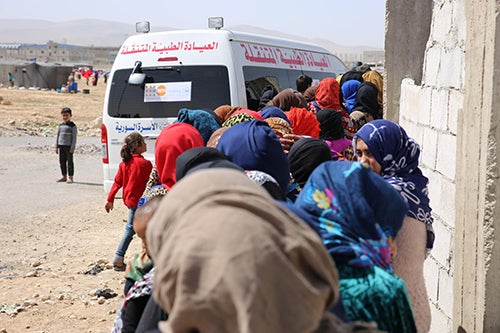Updates
With flexible funding, Finland continues support for humanitarian response in Syria
23 May 2019
Updates
23 May 2019
The Government of Finland has contributed €1.5 million to support UNFPA’s humanitarian response in Syria, enabling the organization to deliver sexual and reproductive health and protection services to the communities where the needs are most acute.
Signed on 7 May 2019 at UNFPA Headquarters in New York, the agreement marks the third consecutive year of Finland’s support for UNFPA’s Humanitarian Response Plan in Syria – now totalling €5.5 million since 2017.
The funding is allocated flexibly. As noted by Arthur Erken, UNFPA’s Director of Communication and Strategic Partnerships, this allows UNFPA to adjust its programming to meet the most urgent needs of Syria’s women and girls.
With support from Finland, UNFPA has provided long-term and emergency sexual and reproductive health services to affected communities across the country. These services include family planning, pre- and post-natal care, delivery care, early detection of cancer, treatment of sexually transmitted infections, and psychosocial support.
From August 2017 through the end of 2018, UNFPA-supported services reached more than 31,000 people in 63 communities in Aleppo, Rural Damascus, As-Sweida and Dara’a governorates.
During the year’s fourth quarter, Finnish support enabled UNFPA to procure more than 19,000 dignity kits containing essential health and hygiene supplies. Through implementing partners, these have been distributed to the most vulnerable women and girls in internally displaced persons (IDP) camps in Aleppo, Hama, Latakia, Rural Damascus and Afrin, as well as among host communities. The remaining kits are ready for distribution wherever needs are most acute.
The funding from Finland has also enabled UNFPA to support a range of services for survivors of gender-based violence, delivered through women’s and girls’ safe spaces, youth centres and health facilities.
In Rural Damascus, the UNFPA-supported Family Protection Unit offers comprehensive medical services as well as psychosocial support, legal aid and vocational training for women and adolescents who have experienced gender-based violence. In Rural Sweida, UNFPA has supported Community Well-being Centres and two mobile teams providing comprehensive services for gender-based violence prevention and response, as well as a male clinic that aims to engage men and boys and raise awareness about gender-based violence.

Finland’s support also contributed to UNFPA’s cross-border operations into Syria, managed from Jordan and Iraq and delivered through implementing partners.
From August 2017 to the end of 2018, cross-border operations managed from Iraq reached over 9,000 people in Syria with sexual and reproductive health services, and 8,000 with gender-based violence services, while also distributing 8,000 dignity kits and supporting emergency obstetric and neonatal health centres and mobile health units.
From Jordan, UNFPA worked with implementing partners to deliver sexual and reproductive health services to 15 IDP and host communities in 2018, serving 38,000 women and girls and enabling over 5,700 safe deliveries. UNFPA also supported six emergency obstetric and newborn health facilities and nine primary health care facilities, as well as deploying 98 community health workers who made over 24,000 home visits throughout the year – their services contributing to a 19 per cent rise in family planning consultations.
“Finland is proud to support UNFPA’s life-saving programmes in Syria and neighboring countries,” said Jussi Tanner, Finland’s Deputy Permanent Representative to the United Nations.
“Our flexible support helped UNFPA adapt its programmes to answer to the most urgent needs,” he added. “It helped strengthen national capacity to respond to gender based violence on the most vulnerable women and girls, and enhanced the provision of sexual and reproductive health services to women and girls in Syria.”